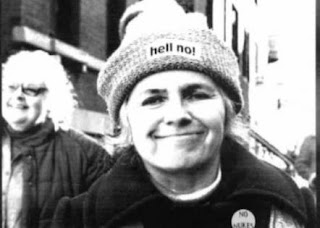INTERVIEWER
In your choice of subject matter, you and [early feminist and American writer] Tillie Olsen have opened the door for a lot of writers.
PALEY
I hope so. Of course, that's not up to me or Tillie to say, Yes, there was the door and we opened it - we can't say that. It's not nice. I will say I knew I wanted to write about women and children, but I put it off for a couple of years because I thought, People will think this is trivial, nothing. Then I thought, It's what I have to write. It's what I want to read. And I don't see it out there.
Meanwhile, the women's movement had begun to gather force. It needed to become the second wave. It turned out that we were some of the drops in the wave. Tillie was more like a cupful.
INTERVIEWER
Was there anyone on that wave before you, who enabled you to write like you did?
PALEY
Well, I didn't know I was on any wave. I knew what I was writing, but I didn't think then that I was part of any movement. I didn't even think I was a feminist! If you had asked me if i was a feminist when I began writing The Little Disturbances of Man, I would have said I'm a socialist - or something like that. But by the end of the book, I had taught myself a lot and I knew more or less who I was. I opened the door to myself.
INTERVIEWER
Do you feel supported by the women's movement?
PALEY
I do feel very supported. There's hardly a woman writer who doesn't receive some kind of support from the women's movement. We're lucky to be living and writing now. I feel supported by lots of men, too, but I feel very specifically the attention of women, even in opposition. And they're the ones I get arguments from: they're the ones who say, Why don't you write about this kind of life or that kind of life? We like the children but why are they all boys? But on the other hand, I was at a conference in California last week, where a young woman kept saying she didn't want to be a woman writer because it trivialized her. The point is that the outside world will trivialize you for almost anything if it wants to. You may as well be who you are.
INTERVIEWER
Why do you suppose she said that?
PALEY
I think she said it because she feels it's true. And there is truth to it. A lot of European women feel it very strongly. They are afraid of being anything but totally universal. But we used to have a saying, "I take it from whence it comes," which is a Bronx version of sticks and stones will break my bones, but names will never hurt me. So you take it from whence it comes, that is, if a certain society decides to trivialize you, it will marginalize you.
INTERVIEWER
Do you think American women writers feel that way?
PALEY
I think they fear being marginalized and rightly so. There's an idea that there's this great mainstream, which may be wide but is kind of shallow and slow-moving. It's the tributaries that seem to have the energy.
INTERVIEWER
You've said that when you're writing you are "doing women's politics." Could you say more about that?
PALEY
Did I say that? If I did I probably meant that if the personal is political - as we all say - then writing about women is a political act. Just like black people writing about the lives of blacks. It's very important to people that they have these stories. And the personal is especially political when it spreads fingers out into the world - because sometimes you find that what is most personal is also what connects you most strongly with others.
INTERVIEWER
Has there been a change of climate from when you first started writing to now, in the nineties?
In 1959 it was absolutely insane for Ken McCormick [editor at Doubleday] to say, yes, he was going to publish a book of short stories. Now everybody in the writing world is reading and writing short stories - that's one thing. Another thing is that a lot more women are writing. A lot of people who wouldn't have written are writing. When a couple of black women speak, the throats of many are opened. Somehow or other they give courage and sound to their sisters.
INTERVIEWER
So you didn't feel that sense of there being a community of women writers in the fifties?
PALEY
I didn't think about it. I just wrote. I didn't say, Oh, there are no women writers, as much as I thought to myself, This subject matter is so trivial. Who in the world would be interested in this stuff?


No comments:
Post a Comment